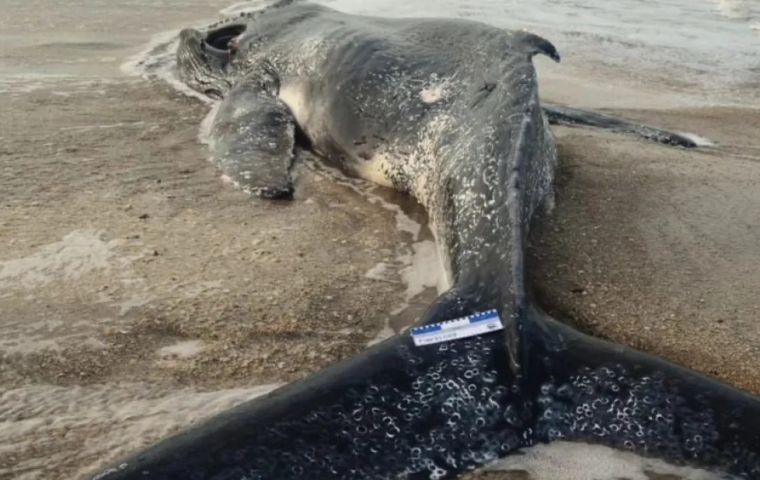MercoPress. South Atlantic News Agency
Young dead whale found in exclusive Argentine beach resort
 The causes of death are yet to be determined. In the meantime, people were advised not to get close to stranded animals given the risk of catching contagious illnesses
The causes of death are yet to be determined. In the meantime, people were advised not to get close to stranded animals given the risk of catching contagious illnesses A dead humpback whale was found by a group of bypassers on the beach shores of the exclusive Argentine resort of Pinamar The causes of the death of the young mammal weighing approximately 15 tons are yet to be determined by experts in the Province of Buenos Aires, it was reported.
Pinamar Ecological Foundation Vice President Cecilia Prieto told local media that the specimen was first spotted on Wednesday night. “We were notified that the whale was in the area of La Pérgola; the whale was dead” already, explained the licensed biologist.
The finding triggered a joint deployment with the San Clemente-based Mundo Marino Foundation with which the Pinamar organization has a standing cooperation agreement to rescue and study marine animals. A team from the Marine Mammals Department of the University of Mar del Plata also went to Pinamar to participate in the investigation.
Given the adverse sea conditions, blood and tissue samples were taken at the site, although it was not possible to determine the sex of the animal due to the high tide.
According to Prieto, humpback whales migrate to high latitudes to feed and return to more temperate zones in winter to mate. “We believe that this whale felt sick, but we will only be able to tell with a necropsy,” she stressed. The samples were taken to the University of La Plata for laboratory examination.
The specialists also pointed out that the whale's body was “fresh”, suggesting a recent death. This case followed a previous finding in northern Pinamar, where remains were found in an advanced state of decomposition, presumably dragged by currents from the sea.
Pinamar Ecological Foundation President Jennifer Pezzo admitted that, although infrequent, there have been several strandings in the area recently. “From the size, it is a juvenile specimen that left the nursing period,” she noted while warning people of the risks involved in getting close to stranded animals. “It is important that people do not climb on the animals or take pictures near them, as there is a risk of contagion of certain diseases,” she said.




Top Comments
Disclaimer & comment rulesCommenting for this story is now closed.
If you have a Facebook account, become a fan and comment on our Facebook Page!